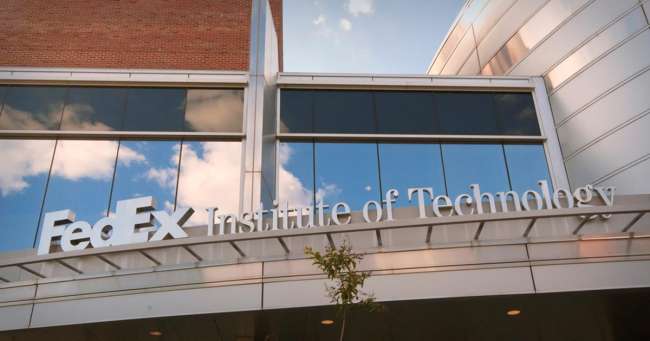FedEx Taps University of Memphis Students to Run Call Center

The call center agents talk on headsets to FedEx employees, helping with passwords and other basic troubleshooting and handing off to specialists if necessary.
They recite the Memphis-based company’s creed, called the Purple Promise — “I will make every FedEx experience outstanding” — and dream about future opportunities in a global 400,000-employee organization.
They could be sitting in cubicles at one of the FedEx facilities scattered across Greater Memphis, but they’re not. They’re University of Memphis students, working in a converted conference room in the FedEx Institute of Technology on campus, the first employees of a new, student-operated call center.
U of M and FedEx officials this week unveiled the call center, where about 20 students will begin handling live technical support calls after a month in training.
FedEx ranks No. 2 on the Transport Topics Top 100 list of the largest North American for-hire carriers.
It’s the first offering of UMRF Ventures Inc., a wholly owned subsidiary of the University of Memphis Research Foundation.
‘I just had to be part of it’
“It’s a connection to FedEx, so I just had to be a part of it in some way,” said call center manager Sherita Johnson, a U of M graduate who previously worked in an on-campus technical support call center.
“It’s a very, very easy transition because FedEx, they know who they are and they’re confident in what they do and they so easily portray that,” Johnson said. “You know the Purple Promise is just that. It’s so simple. It is like, ‘I will make every FedEx experience outstanding.’ It’s not like 10 paragraphs with 10 bullet points of stuff. They make it simple and they live by it.”
Jennifer Hawkins, a sophomore Japanese major and computer science minor, who previously worked in retail, said, “It was exactly what I was looking for. It was on campus, reasonable hours and good pay.”
UMRF Ventures CEO Thomas Kadien, a recently retired International Paper senior vice president, said, “Our mission is really to create well-paying jobs in a professional environment here for our students on campus, give them the kind of experiences that will better prepare them for a career beyond the University of Memphis.”
‘Cool new ways of doing things’
Other possible ventures could be processing loan papers for a bank, fundraising or work for the city or Memphis Light, Gas & Water, Kadien said. “I hope to have several different ventures up and running a year from now,” he said.
Rob Carter, FedEx executive vice president and chief information officer, said the venture helps fulfill the potential of the FedEx Institute of Technology.
“It was part of the dream that it would be in fact a center of innovation that would cause cool new models and cool new ways of doing things to burst onto the scene and to be a point of pride for the university and FedEx and our city,” Carter said.
“It’s clearly a win for FedEx, our opportunity to connect with this bright new generation of digital natives that understand technology to their core, ideally suited to handling some of our technical support calls,” Carter said. “It’s a wonderful win for our company because it also prepares these students to better enter the workforce and potentially enter our workforce.”
Career pipeline, FedEx feeder
It wasn’t hard to fill the positions, said U of M Chief Innovation Officer Jasbir Dhaliwal, who worked on the startup with FedEx Vice President of Information Technology Operations Gary Bronson. “Everybody in Memphis wants to work for FedEx,” Dhaliwal said.
Undergraduates work about 20 hours a week. They train at $13.80 an hour and move up to $15 an hour when they’re fully proficient. Supervisors make $20 an hour.
University President David Rudd said the pay is enough that students don’t need other part-time jobs and are able to concentrate on their studies.
Also, “This creates a workforce pipeline for entities like FedEx or any other partner that we have, where they’re familiar, they’ll train, they’re part of the culture. Once they complete their education, they’re able to look at other full-time opportunities,” Rudd said.
The center is initially operating 8 a.m. to 8 p.m. and is expected to handle up to 5,000 calls a month during its first year. Another dozen students will be hired this fall, and the center plans to eventually become a 24/7 operation.
Job One is customer satisfaction
Kadien said, “Job One is making sure FedEx is happy, because they have more business they would like to give us. We’re going to be handling a small, double-digit, 10% kind of their call volume for Level One help centers. But that means there’s 90% of the business that we don’t have. If we can cost effectively compete and gain more of that business, we can outrun this room and find some more real estate,” Kadien said.
Carter said the U of M call center is picking up work that FedEx gives to external call centers.
“We have a base load of employees that kind of handle normal volumes and requests in normal hours, and we tend to spill over into external providers in high-volume times or off-hours times or for supplemental needs,” Carter said. “For us it’s always been a supplemental thing on top of team members we have that do the work.”
Carter described “Level One” work done by the center as “kind of triage. This is the triage call where it comes in. If it’s a complicated issue where there’s clearly something wrong versus ‘How do I get this connection to work or my password reset?’ they do triage and they can open a ticket and they can refer it up to Level Two and Level Three support, where people are maybe more expert in a particular application,” Carter said.
Distributed by Tribune Content Agency, LLC




